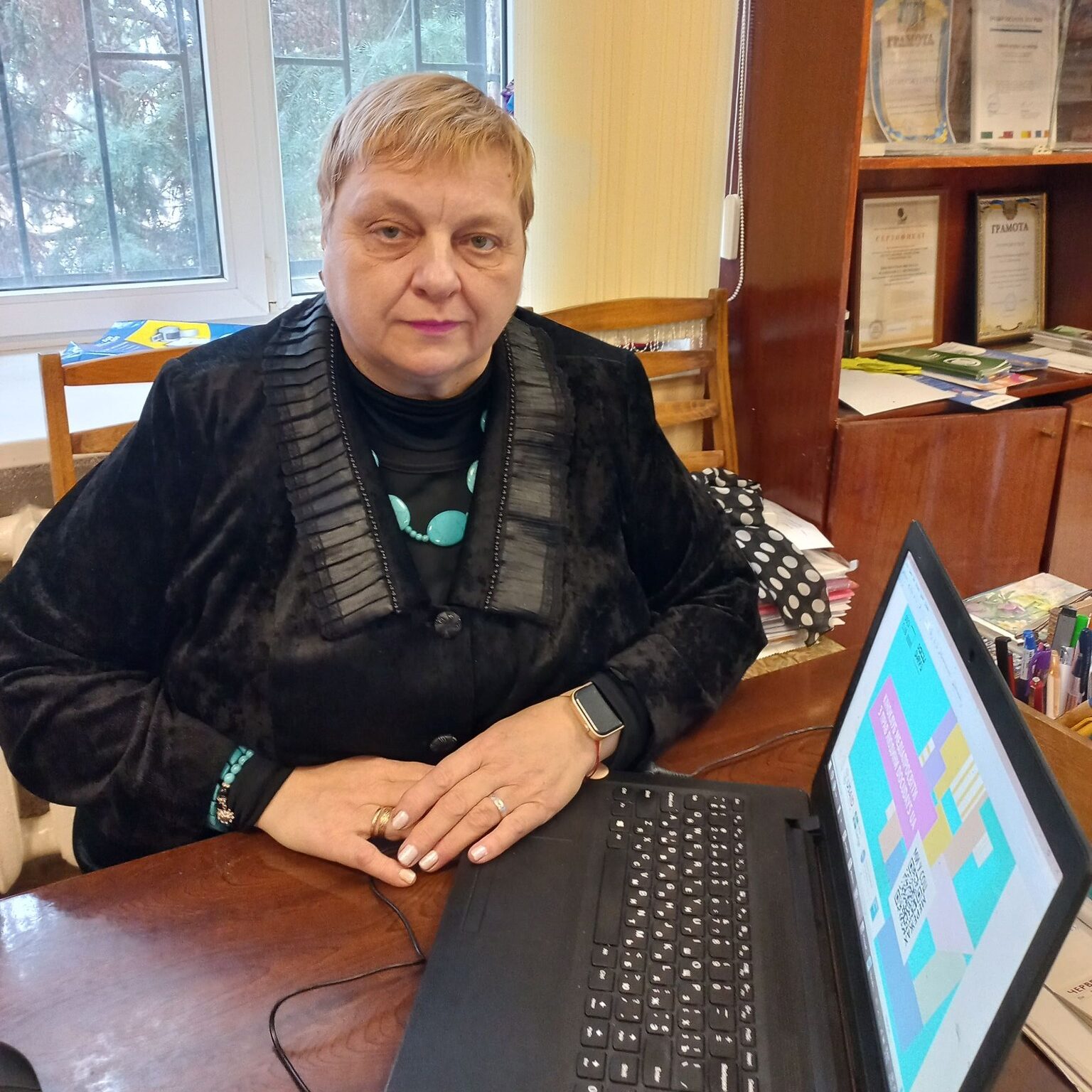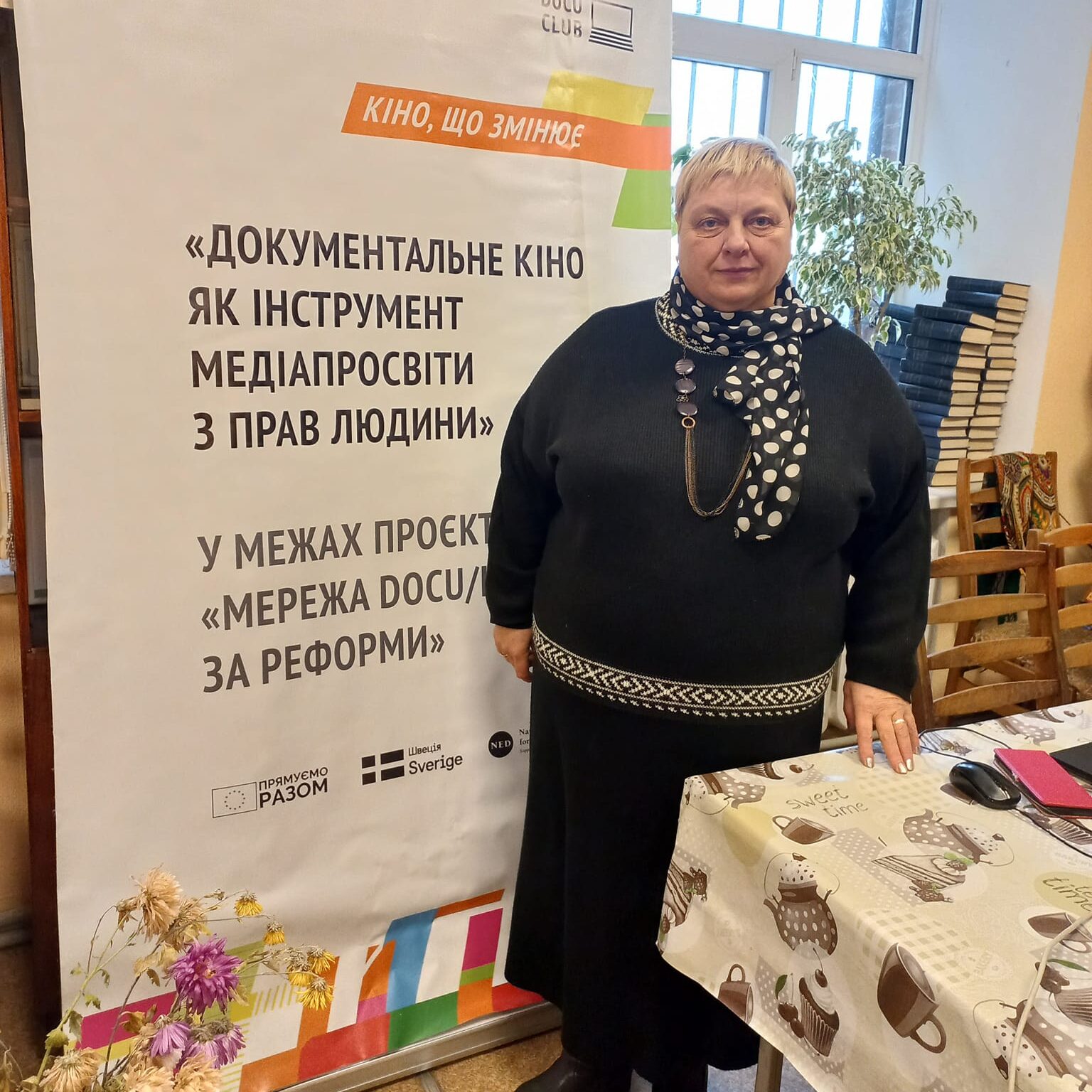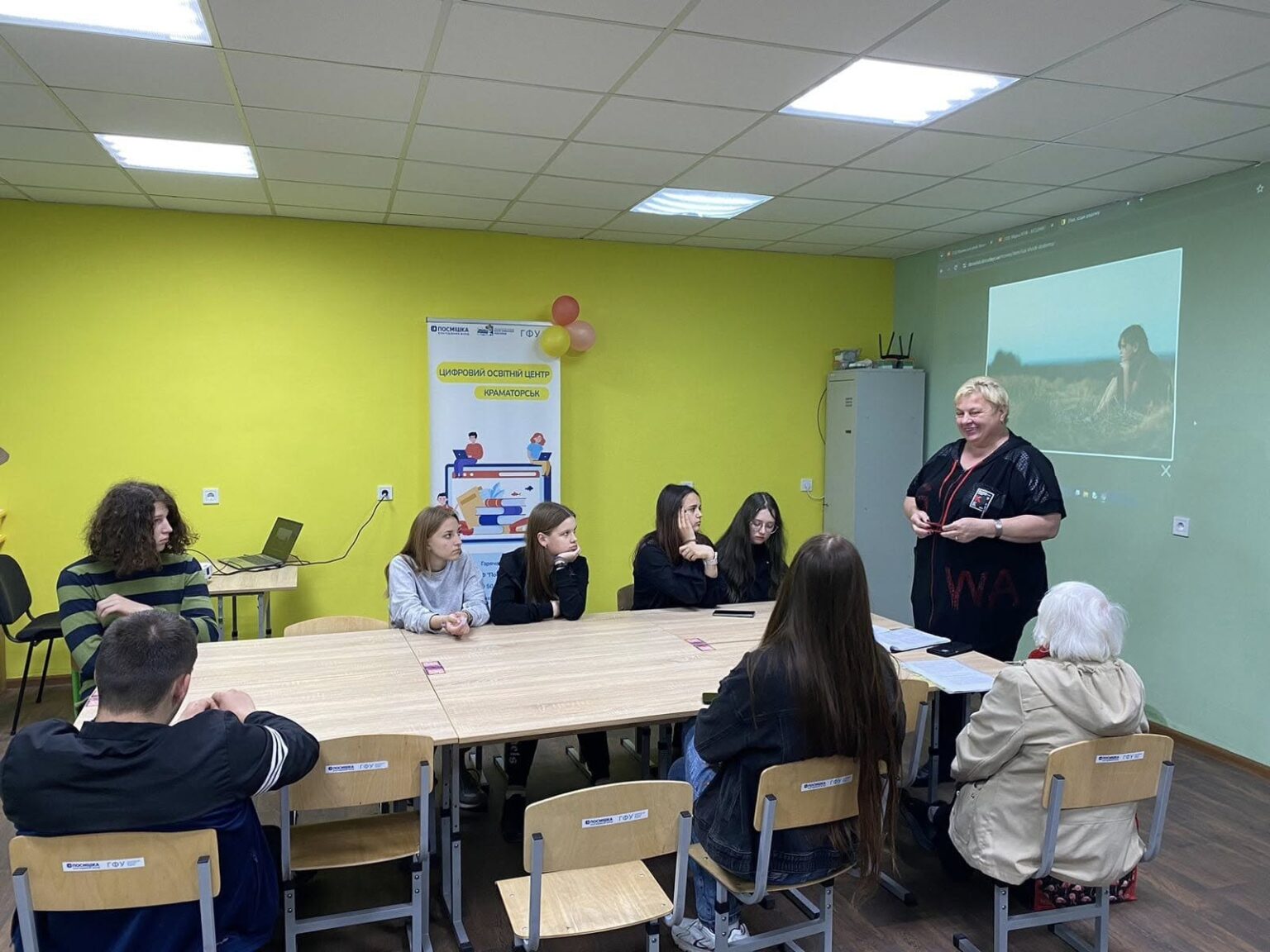
The village of Shabelkivka in the Donetsk region, located 10 kilometers from Kramatorsk, has been in the war zone since 2014. Back then, at the beginning of the Russian-Ukrainian war, its unarmed civilian residents resisted enemy militants and dismantled a separatist checkpoint. Today, Shabelkivka hosts internally displaced persons, a number of civic initiatives, and – surprisingly – a documentary film club.
 Photo from Svitlana Sadova's archive
Photo from Svitlana Sadova's archive
“This is a human rights education initiative. We are actualizing the dialogue about human rights, raising our citizens’ awareness about the protection of their rights,” says Svitlana Sadova, the film club moderator. “Documentary films allow the viewers to live through experiences of real people. This touches the audience's hearts. Discussions about human rights that follow the screenings are very emotional.”
The “Femida” (‘Themis’) documentary film club has been operating at the Shevchenko Library in Shabelkivka for 10 years. Back then, Svitlana Sadova became one of the winners of the competition organized by the DOCU/CLUB Network and the ‘Bibliomist’ programme for modernization of public libraries. Since then, the film club in Shabelkivka has been inviting viewers to screenings and discussions of human rights documentaries several times a month.
“I mainly work with children,” says Svitlana. “What they saw on the screen would surprise them at first, because children were not used to such films. At the beginning, I held extracurricular lessons for pupils of our educational complex. The kids would keep quiet during film discussions, afraid to express their opinions; however, they gradually got used to the new format and started looking forward to the screenings. Children are interested because they know the film club is a place where they can confidently express their opinions, and they do not hesitate to ask questions.”

Photo from the archive of Svitlana Sadova
For children from a small village, screenings of documentaries have indeed become important events. To deepen the experience of the screenings, the film club moderator invited various experts to Shabelkivka to discuss films with children. Psychologists, lawyers, specialists from the legal aid bureau, police officers from Kramatorsk and Sloviansk – the pupils are eager to discuss human rights with all of them, actively ask questions and, most importantly, get answers.
The moderator explains, “Parents are not always able to answer such questions or discuss these topics with their children. In the film club, we look for answers together with specialists and human rights experts. Children are very grateful for this. I often hear from them that school lessons cannot compare to these film club events. Before the full-scale war, school graduates would bring me roses and say, ‘This is for you being you.’ Can you imagine how nice it feels to hear that? It made me cry.”
The reasons for these sentiments are understandable. The film club has become a place that helps children feel that they matter and realize they can influence the life of their native village. For example, after watching the environmental films E-Wasteland by David Fedele and Out of Fashion by Jaak Kilmi and Lennart Laberenz, children were eager to implement their own environmental project. They met many times, discussed it, created a plan for cleaning the area and implementing systematic waste management, and developed a route for an ecotrail. The project is completely ready, but its implementation was hindered by the full-scale invasion.
Unfortunately, for the last six months, offline meetings at the film club have been impossible for security reasons. The proximity of the frontline has prompted many parents and their children to leave their native village, and all of this year's classes are being held online. Power outages are frequent in Shabelkivka due to shellings, but the film club still continues to operate. Moreover, it has become an online space for informal meetings and communication of youths.
“Our pupils now study at different schools in Ukraine and abroad, but they join the screenings, ask their questions, and discuss the films. Sometimes they ask to find information on a certain topic or to discuss an issue that is relevant to them. In fact, the film club helps them keep in touch with their home and peers who stayed here or moved to other regions or countries,” says Svitlana Sadova.
The DOCU/CLUB Network collection includes over 140 films on various topics by prominent Ukrainian and international directors. Most of these films have been awarded at the most prestigious international festivals such as Docudays UA in Kyiv, Sundance Film Festival in the USA, or Watch Docs in Warsaw. Thus, teenagers and young people in a village in the Donetsk region, several dozen kilometers from the front line, watch films about life, desires, and problems of their peers in other countries.
“They don't want to watch films about war because they hear and feel it in their daily lives,” says the moderator, ”but they are interested in watching, for example, Pranked by Ismaёl Joffroy Chandoutis about the threats of cyberbullying or The Shepherd by Matthias Julot and Lucien Roux about choosing one's life path and profession. They were emotionally touched by the film Giovanni and the Water Ballet by Astrid Bussink. We’ve spent a long time discussing obstacles on the way to their dreams and the importance of support from friends. I am convinced that such films prepare children and youths for their future and shape their moral beliefs, which is very important.”
 Photo from the archive of Svitlana Sadova
Photo from the archive of Svitlana Sadova
Svitlana Sadova also actively engages adult residents of the village in the screenings. She says it allows them to distract themselves from reality, learn something new, and share their thoughts with fellow villagers. The library has already turned into an educational center and humanitarian headquarters. The library staff works with IDPs, assisting them in getting information, preparing and scanning documents, and registering the villagers for humanitarian aid.
“We try to obtain certificates for providing all possible services and then go straight into battle,” the librarian laughs. “You know, it's hard work. People come every day, and you have to talk to them, listen to them, and reassure them. But it's good there is a place where they can go. Just today, when I was going to work, there was a long line of people registering for fuel. We have no time for boredom.”
Paradoxically, the film club is developing even in these challenging circumstances, getting requests for new screenings and establishing new partnerships. The Community Development Foundation, the Kramatorsk Higher Vocational School for Metallurgy, and even a Ukrainian school in Denmark are just some of the examples of new cooperations with the film club and its moderator. “To be honest, I'm also surprised,” Svitlana admits. “I thought everything would come to a halt, but our partners always find us. This means we at the film club are doing something important and necessary for people.”
This year, the “Femida” film club in Shabelkivka faces another important challenge. Together with other film clubs of the DOCU/CLUB Network, it has joined the all-Ukrainian informational campaign “Sexual abuse on the Internet: How to protect children.” Svitlana Sadova has already planned screenings of the film Caught in the Net by Czech directors Barbora Chalupová and Vit Klusák, which tells how abusers use the Internet to obtain explicit photos and videos of teenagers and what consequences this can have.
Although this issue is complicated even for adults, the film club moderator is confident that she will find a common ground with younger viewers: “Documentary films have a huge impact on children. They are an effective educational tool, and children are a very grateful audience. With the help of documentaries, I try to prepare children for life in this world. I don't want to stop this work, and our film club always remains relevant.”
All news



